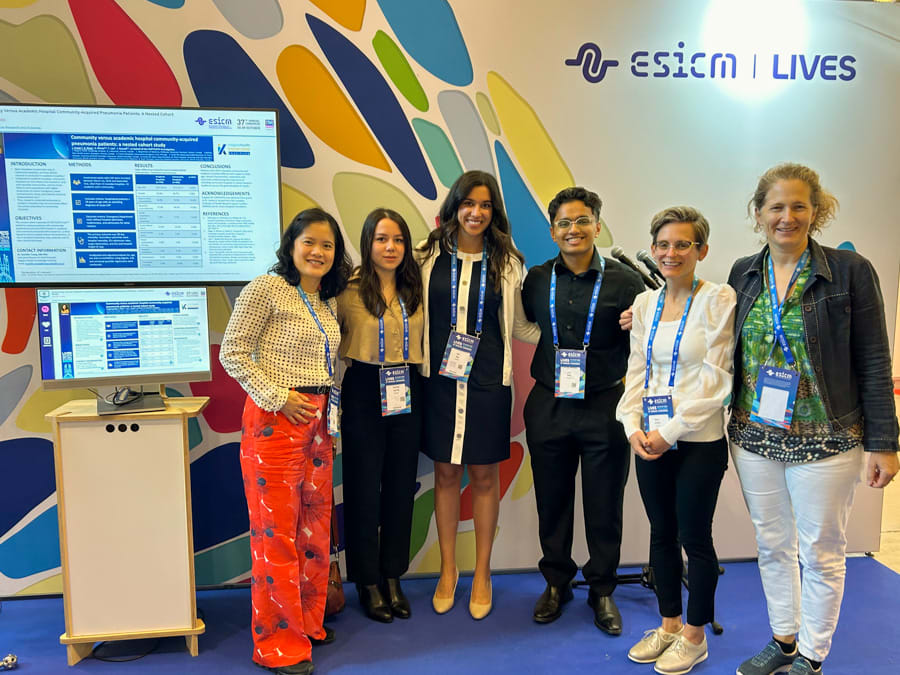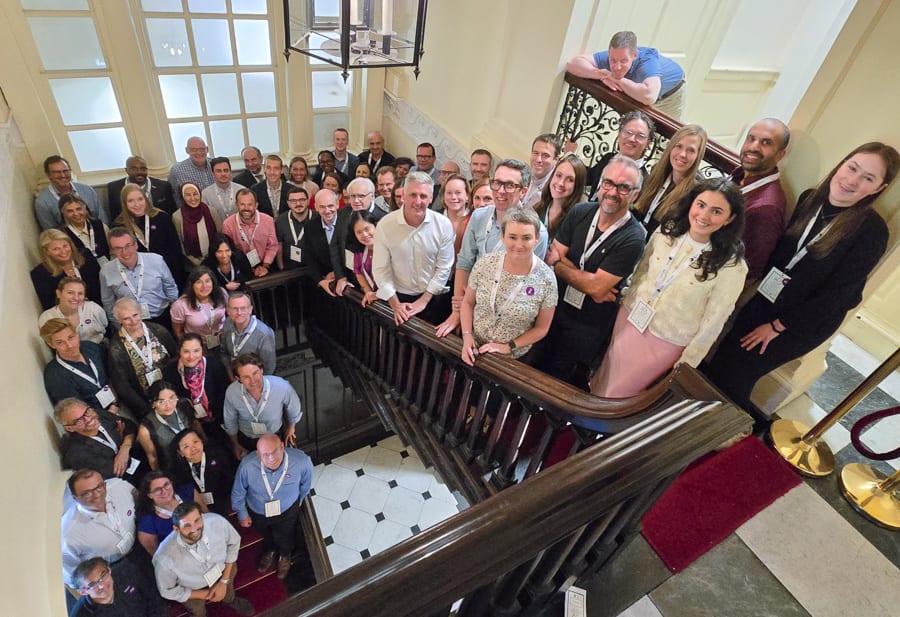The research we conduct at Niagara Health has a profound impact on the health and well-being of our patients and communities, and contributes to better understanding some of the most significant healthcare challenges of our time with the potential to benefit patients in Niagara and across Canada.

Niagara Health Knowledge Institute researchers and trainees at the European Society of Intensive Care Medicine (ESICM) Congress in Barcelona, Spain, last week. From left: Dr. Jennifer Tsang, NHKI Executive Director and Chief Scientist; Vanessa Gyorffy, 2023 NHKI summer student; Kian Rego, Research Co-ordinator; Prey Patel, former NHKI volunteer researcher; Elaina Orlando, NHKI Research Manager; and Dr. Alexandra Binnie, an Intensivist from William Osler Health System in Toronto.
The Niagara Health Knowledge Institute (NHKI) is making a name for itself well beyond Niagara’s borders.
NHKI researchers and staff were invited to share their expertise and research findings at recent prestigious international healthcare conferences, including one that counts the World Health Organization among its organizers.
Last month, Dr. Jennifer Tsang, NHKI Executive Director and Chief Scientist, attended the Global Co-ordination, Federation and Support of Platform Trials meeting in Dublin, Ireland, where she discussed her experience building community hospital research capacity in Canada and how that knowledge could be applied to build research capacity in low- and middle-income countries ahead of the next global public health emergency.
Organizers of the Dublin meeting included the World Health Organization, the Irish Critical Care Clinical Trials Network, the International Severe Acute Respiratory and Emerging Infection Consortium and the International Forum for Acute Care Trialists (InFACT).
Unlike conventional clinical trials that study a specific disease intervention, platform trials are open-ended studies that can continue indefinitely, with new interventions being added or removed as time goes on.
“The ultimate goal is to share knowledge and resources, and have the infrastructure in place to study emerging health emergencies and allow low- and middle-income countries to not only participate in research but lead research,” says Dr. Tsang, who self-funded her attendance at the Dublin meeting.
“How is a country going to study Mpox, for example, if they don’t have the infrastructure to do it?” she adds. “A patient in Africa is going to be very different than a patient in the U.S. and federating platform trials is one way to give everyone access to clinical trials. It’s the same reason behind doing community hospital research in Canada – it builds equity in healthcare and that’s one of the mandates of the NHKI."

Dr. Jennifer Tsang, NHKI Executive Director and Chief Scientist, attended the Global Co-ordination, Federation and Support of Platform Trials meeting in Dublin, Ireland in September. She is seen here with other attendees, leaning on railing a few steps up from the middle landing.
While at the global meeting, Dr. Tsang participated in discussions that could see the Community ICU Research Toolkit, an open-access guide to building and maintaining clinical research programs in community hospitals, adapted for use in Pakistan. Dr. Tsang led the development of the toolkit with Dr. Alexandra Binnie, a critical care physician at William Osler Health System in Toronto.
A research learning module developed by NHKI will also be shared for use in the South Asian country.
“We’re committed to sharing our expertise for the greater good,” Dr. Tsang says. “Our team put time and effort into this module, so why not share it?”
NHKI goes to Spain
Five NHKI researchers and trainees were also invited to present their work at the European Society of Intensive Care Medicine (ESICM) Congress in Barcelona, Spain, last week.
Vanessa Gyorffy, a 2023 NHKI undergraduate summer student, did a poster presentation on her innovative blood biomarker study that’s set to be published in the PLOS ONE journal. Gyorffy’s findings, which show plasma biomarkers can remain stable for up to 72 hours, even at room temperature, pave the way for more community and remote hospitals to participate in health research, regardless of where in the world they’re located.
Prey Patel did a poster presentation of his findings from volunteer work he did with Dr. Tsang and the NHKI on a scoping review of research activities in Ontario community hospitals. Patel, a Welland resident and first-year medical school student at Queen’s University, based his honours thesis, written as a health sciences student at McMaster University, on the topic. This work was accepted for publication in BioMed Central Health Services Research.
NHKI Research Manager Elaina Orlando presented on her post-doctoral fellowship work, which is an intrinsic descriptive case study of community hospital research programs, while research co-ordinator Kian Rego, presented two posters: one about the influencing factors of community hospitals’ participation in research and the other comparing patients with pneumonia cared for in community hospitals to those in academic hospitals. Both studies were accepted for publication in the Canadian Journal of Anesthesia and BioMed Central Pneumonia respectively.
Heather O’Grady, a post-doctoral fellow at the NHKI, was invited by the ESICM to present her findings at a plenary session on an updated systemic review and meta-analysis of leg cycle ergometry in critically ill patients. Her research was published in the New England Journal of Medicine Evidence the same day. Dr. Rucha Utgikar, an intensivist at Niagara Health, was a co-author on this study.
Attendance of the presenters at the congress was either self-funded, including using vacation time to travel, supported by grant funding allotted for conference attendance or paid for by the ESICM.
“To have five posters at the same conference and to have a plenary talk is really quite noteworthy. It’s also quite impressive to have that much productivity in the 16 months since Niagara Health formed the knowledge institute,” Dr. Tsang says. “This shows people’s passion, working after hours, using their own money to achieve this career goal, and we’re proud of NHKI’s role in training the next generation of health researchers.”

